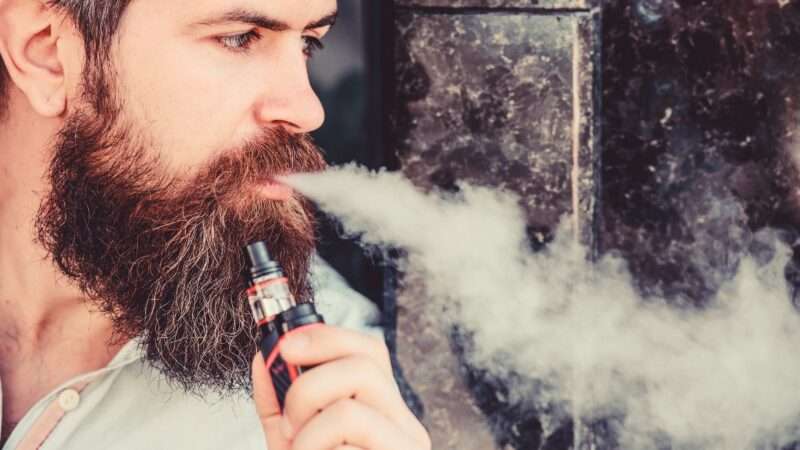
California voters will have another chance to override lawmakers trying to control their personal choices in November with a vote on Proposition 31, which challenges the state's ban on flavored tobacco.
Lawmakers passed S.B. 793 in 2020. It bans the sale of flavored tobacco products (including flavored e-cigarettes), with exceptions for hookah tobacco, premium cigars, and loose-leaf tobacco. The whole ban has been sold as a way of stopping Big Tobacco from marketing products to children, though the ban affects everybody.
It also bans menthol cigarettes, which are popular among black smokers. The menthol ban paternalistically treats black smokers like hapless victims of advertising who aren't able to make their own choices, suggesting that the state has to do it for them.
In September, in his analysis of Prop. 31, Guy Bentley, director of consumer freedom at Reason Foundation, the nonprofit that publishes this website, noted that many of the arguments in favor of the prohibition don't hold up. A study from 2017 shows that black youths in California have the lowest smoking rates of any group, while black adults have the highest, meaning they aren't getting hooked while they're young. This ban is clearly not about stopping minors from smoking (because it's already illegal for anyone under 21 to smoke), but stopping adults from consuming a disfavored product.
Bans foster any number of unintended consequences. Massachusetts beat California to the punch by a couple of months and banned flavored tobacco products (including menthol cigarettes) in 2020. Reason Foundation Policy Analyst Jacob Rich crunched sales numbers a year after the ban and found that the end result was an increase of nonmenthol cigarette sales within the state and a dramatic increase in cigarette sales in the states surrounding Massachusetts.
If a ban on menthol cigarettes leads to a black market for the good, you can guess who police are going to target. Bentley lays it out for us:
Given that menthol products are disproportionately popular among black smokers it's reasonable to assume black communities could suffer from further unnecessary contact with law enforcement if menthols are banned. The American Civil Liberties Union (ACLU) and law enforcement organizations such as the National Organization of Black Law Enforcement Executives (NOBLE) are among the groups that have voiced concerns as it relates to a proposed national menthol ban by the Food and Drug Administration. Similar concerns would exist in California.
California Attorney General Rob Bonta is among those encouraging the Food and Drug Administration to follow through with that national menthol ban. This is how we end up with more Eric Garners.
That the ban also includes flavored vapes illustrates how it's an attempt to attack disfavored products and those who want them regardless of the actual public health benefits. E-cigarettes are much less harmful than typical cigarettes and can be used as a mechanism for helping traditional smokers quit. Bentley notes:
There's also a growing body of evidence showing that e-cigarettes are more effective than traditional nicotine replacement therapies at helping smokers quit. While e-cigarette flavors are portrayed as being targeted at youth, most adult vapers trying to quit smoking use non-tobacco flavors. According to research conducted by Yale University's Abigail Friedman, vapers using non-tobacco flavors are more likely to successfully quit smoking than those who don't.
In addition, we're seeing data showing that vaping is declining among teenagers anyway, something ban supporters seem insistent on ignoring.
More than $25 million has been raised by both sides of this campaign for Prop. 31. Infamous nanny-stater Michael Bloomberg contributed more than $4 million in cash and in-kind donations to keep the ban in place. Top tobacco companies like R.J. Reynolds and Philip Morris have contributed more than $18 million to try to convince voters to strike the ban down. The state's Democratic Party supports the ban, while the Republican Party opposes it. A September poll from the Berkeley Institute of Governmental Studies finds 57 percent of Californians support the ban, 31 percent oppose it, and 12 percent are undecided.
It's somewhat unfortunate if those numbers end up reflecting the final vote. Californians have shown a propensity to overrule Sacramento lawmakers when they attempt to pass laws like this that control what people are allowed to do. We saw it in 2020 when California voters overturned or amended several state laws, including one that forced ride-sharing and delivery companies to treat independent contractors as employees, even against the desires of the drivers themselves.
The U.S., through various failed attempts at prohibitions and disastrous drug wars, has shown that product bans won't stop people from consuming the goods they want to consume. They instead foster black markets that make life more dangerous, both through the relentless enforcement from government officials and the criminals looking to cash in on the continued demand. The Golden State is home to a bizarre marijuana black market that is the result of an overly oppressive regulatory system even though recreational marijuana use has been fully legalized. It is absurd to think that a ban on tobacco goods is not going to end up in the same place.
The post Will Californians Overrule the State's Intrusive Flavored Tobacco Ban? appeared first on Reason.com.







